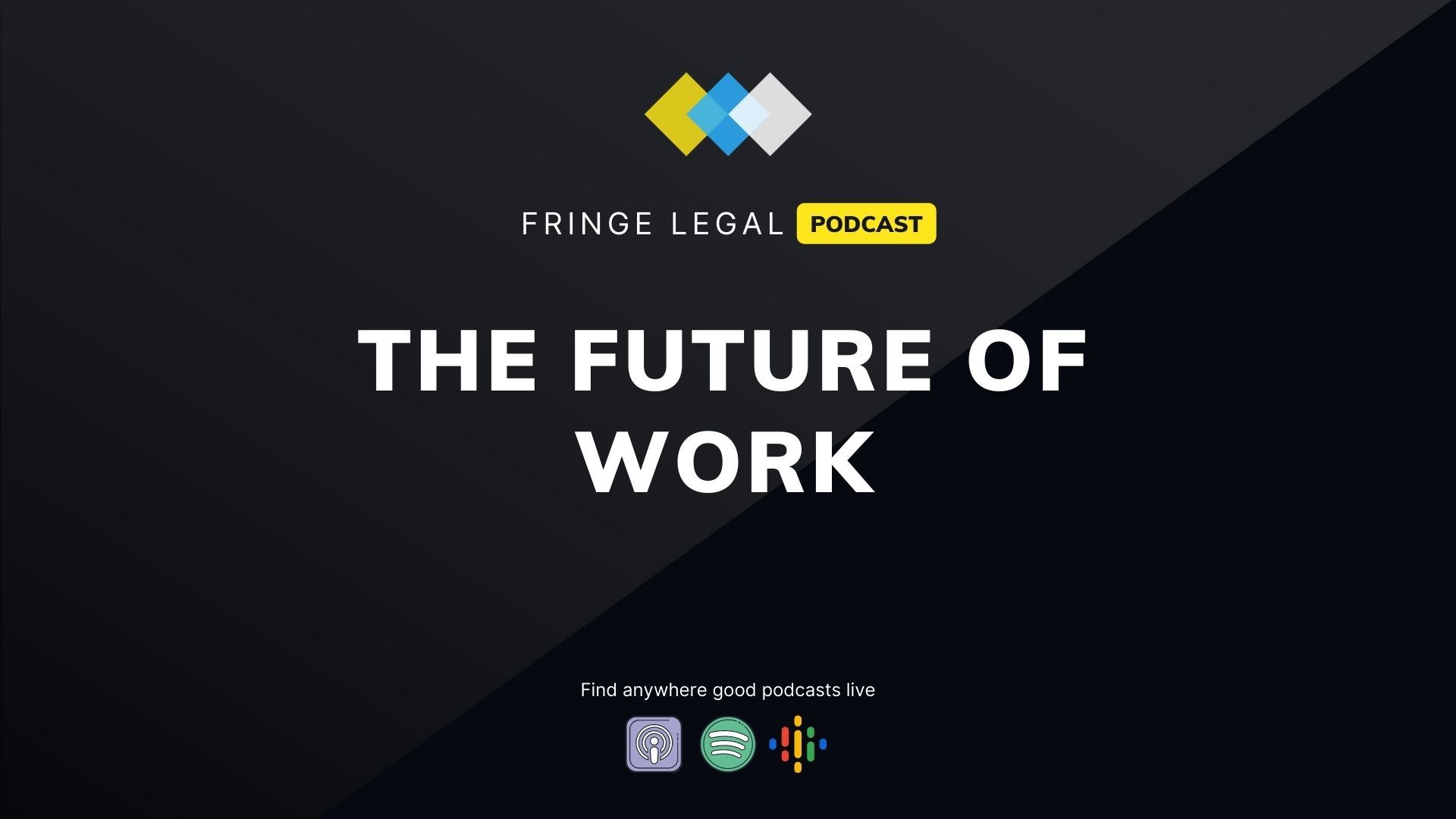Fringe Legal #65: the future of work

What is the future of work?
Even at a broad level, this is a complex topic, and as you focus on legal teams and law firms, it becomes more complex. Discussions around innovation, digital transformation, leveraging technology all lean into supporting this theme.
Recently, I sat down with Matt Coatney to delve deeper. I've extracted some key points from our chat for this week's newsletter, hoping they will help you reflect on the future of work.
Please note that quotes below have been modified to suit a written format.
The future of work
Split into two broad camps - what and how:
- the delivery of work
- the impact of technology
Delivery of work
I think it does change radically, and we've already seen some of the first signs of that over the last couple of years. When I think about the delivery of work, we have shifted, as a society, away from the routinized, repeatable kind of work that would be administrative; it's manufacturing; it's these kinds of things that are relatively routinizing, follow the blueprint and then scale that out.
We've seen this gradual trend toward much more project-based work: you have a goal, a set of deliverables; you have an approach; you have a team that you've formed to do that. You complete the project, and then you move on.
What is striking is that we in law talk about matters, and we're delivering the practice of law and all of that - really, what we're doing is delivering thousands and thousands of projects each year as a law firm.
(Alternative) Career paths for lawyers
We are finding that what used to be considered alternative career paths for lawyers are simply career paths. Everything from legal technology to specialization in particular kinds of law to generalists, project managers, and leaders. So it runs the gamut.
What's exciting to see about that is it's turning into more of a mature corporation versus this sort of loose tribal collaboration of disparate practice groups. Some fear that it might somehow taint or ruin what is good with the law, but I don't see it that way. I think it's a natural evolution; it's healthy.
The role of technology
The pandemic has been a great reset for many, including lawyers and law firm leadership, to look at things anew. A recession didn't trigger the kind of change we had hoped for, but this may well.
It's applying technologies that other industries have used for solid project management, strategy, financial sense-making. It's all of those kinds of tools. There's nothing new that I think we need to invent, but it's leveraging these capabilities inside a law firm - that can look like practice management or collaboration software. It could be things like running a sprint that helps you manage the work better. A lot of good old-fashioned financial data reporting. What's our budget for this matter or project. How are we doing against it?
It does not need to be super complex, novel, or disruptive innovation to get the job done. Most of the firms aren't doing this well, not nearly as well as they could. There's a lot of data that they're just not taking advantage of - it's stuck in silos, or it's not being reported.
Looking ahead
Three ways to approach the future of work:
1) Produce greater value.
The gap between the spend and the value is too great. Start smaller, identify a couple of specific use cases, and then grow it organically over time...
The experience both comes into when the work is done and in the delivery of the work. We as a profession are thinking a lot more about how we equitably staff our matters in ways that builds the talent we need, as opposed to just throwing more bodies at a project.
2) Strong core, adaptable periphery.
The pricing model, the delivery model, the data analytics you use should all be tailored to the type and needs of the work. So it's not a one size fits, but you should have templates and best practices and structure around that.
When I think about matters, I think about the large complex ones, high volume individual ones, and then the middle, the great middle, which is moderately complex. Having approaches for each of those three is much, much easier than having 27 different approaches for every single customized practice group you might have.
3) From just lawyers to business advisors.
The law firm of the future is a firm that empowers people to do their best work and really immerse with their clients. Draw analogies to the management consulting example, to be that trusted partner across the board.
As a profession, we have created this barrier, this wall to say if it's a legal matter, talk to me anything else, no. Some of the better firms and the better lawyers have pivoted into being business advisors, who also happen to know the law. The more we see that the more valuable the lawyers will be and the sturdier the firm will be. It will buffer against some of the commoditization of law that we see with technology and other service providers. It provides a barrier or at least a moat against some of those threats.
Listen to the full episode here

How did you like this issue?







Become a Fringe Legal member
Sign in or become a Fringe Legal member to read and leave comments.
Just enter your email below to get a log in link.